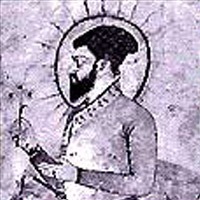Ghiyas-ud-din Balban was born in a well-to-do Turk family of the Ilbari tribe. The Mongols captured him when he was a child. They sold him to Khwajah Jamal-ud-din Basri in Baghdad. Later he was brought to Delhi where Iltutmush purchased him. From the beginning he was in the good books of his master and eventually became one of the Chalgan, a group of the forty most important nobles of the court. During the rule of Nasir-ud-din Mahmud, he became the most powerful amongst the Chalgan. While Nasir-ud-din spent most of his time engrossed in religious affairs, Balban was the real ruler. Nasir-ud-din married Balban’s daughter, which made the latter even more powerful. After the death of Nasir-ud-din, Balban became the Sultan in early 1266.
Balban considered himself, the king, as the deputy of God on earth. He believed that the king should be very powerful so as to frighten everyone around him. He organized his court on the pattern of the courts of Irani kings. Nobody could even dare smile in his court. Smartly dressed well-built soldiers armed with unsheathed swords marched along beside him wherever he went. A number of rulers and princes who had taken refuge in his court were supposed to stand obediently in the court. Some ambassadors even used to faint when he entered his court. Balban established the department of intelligence. He spread his spies throughout the country and used them to gather information about all political developments and conspiracies. This helped him in taking action to stop trouble before it started.
As a Sultan, Balban adopted a blood and iron policy. He knew that during the twenty-year rule of Nasir-ud-din, the Chalgan had become very strong. Each one of them started to consider himself as a second to the Sultan. They did not like the growing power of Balban and were jealous of his ascent. After becoming Sultan, Balban decided to crush the power of the Chalgan. He had some murdered while others were banished to far off places.
When Balban ascended the throne, the Mewatis, Jats and Rajputs had become strong and often revolted against the government. The Mewatis lived near Delhi and had become so bold that they used to plunder the people living right outside the four walls of Delhi. When the royal forces were sent against them they took refuge in the jungles. Balban ordered his forces to crush them even if they had to completely destroy the forests.
During Nasir-ud-din’s rule, the Mongols had advanced many times and plundered Lahore. In order to check the Mongol invasion, Balban built new forts and ordered the repair of the old ones between the river Indus and Delhi. He deployed the best of his troops on the northern borders to check the Mongols. His policies paid off, as he managed to stop the Mongol threat from advancing into his territories.
In the last days of Balban, Tughral Baig, the governor of Bengal, revolted against him. Bengal was far away from Delhi and the Sultan was very old. An army sent by Balban was defeated. In spite of his old age, Balban decided to lead an attack against the rebellion leader. He re-conquered Bengal and hanged thousands who took part in the revolt. He appointed his son Bughra Khan as the governor of Bengal and warned him that he would meet the same fate if he ever revolted against him.
The greatest setback for Balban in his entire life was the death of his favorite son, Prince Muhammad, during the war against the Mongols. He realized that without his son, the centralized monarchy that had been built up with such care was bound to dissolve again, as it had at the death of Iltutmush. This realization broke him. He never recovered from the death of Prince Muhammad and died in 1287.
In short Balban put the Muslim rule on firm footings. He completed the task started by Iltutmush. He made the Muslim rule in India so strong that it lasted in one form or the other till 1857.
This article was last updated on Sunday, June 01, 2003






